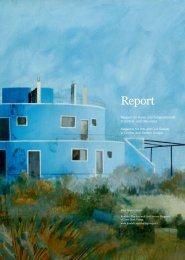Report_Issue 1/2009 - Jubiläum/ 20 Jahre Mauerfall
Report_Issue 1/2009 - Jubiläum/ 20 Jahre Mauerfall
Report_Issue 1/2009 - Jubiläum/ 20 Jahre Mauerfall
Erfolgreiche ePaper selbst erstellen
Machen Sie aus Ihren PDF Publikationen ein blätterbares Flipbook mit unserer einzigartigen Google optimierten e-Paper Software.
„Das Wissen über<br />
traditionelle Arten<br />
der Zubereitung<br />
ist in Bulgarien<br />
verloren gegangen“<br />
Alek Popov „Ich bin im Bulgarien der späten sechziger und<br />
frühen siebziger <strong>Jahre</strong> aufgewachsen. Wir waren natürlich<br />
keine kundenorientierte Gesellschaft und die Nahrungsmittel<br />
beschränkten sich auf das Wesentlichste. In dieser<br />
Situation kam es auf die Kochkünste an, was man daraus<br />
machte. Ich hatte Glück: Meine Großmutter und meine Mutter<br />
waren sehr gute Köchinnen.<br />
Auf den Tisch kam ganz traditionelles Essen. Es gibt sehr<br />
viel gegrilltes Fleisch, ähnlich wie in Griechenland, der Türkei<br />
oder Serbien. Die Speisekarte in den Restaurants bestand<br />
lange Zeit vor allem aus Fleischbällchen, Kebab und<br />
Steaks. Die Lokale gehörten alle irgendeiner Organisation<br />
an und die Auswahl der Speisen, die sie anbieten durften,<br />
wurde ihnen vorgeschrieben. Das Essen war gut und günstig,<br />
aber irgendwann hatte man es satt.<br />
Wir haben mittlerweile eine ungemeine Vielfalt an Lebensmitteln<br />
und dennoch ist dem Essen etwas abhandengekommen.<br />
Das gegrillte Fleisch ist nach wie vor omnipräsent,<br />
aber das Wissen über traditionelle Arten der Zubereitung<br />
ist verloren gegangen. Wenn ich Fleisch möchte, gehe ich<br />
inzwischen lieber in ein griechisches Lokal anstatt in ein<br />
bulgarisches. Was die bulgarische Speisekarte heute auszeichnet,<br />
ist ein Durcheinander an Geschmacksrichtungen<br />
und kulinarischen Zugängen. Es kann einem leicht passieren,<br />
dass man bei der Kellnerin etwas Einfaches, Traditionelles<br />
verlangt – und sie einem Hühnchen auf chinesische<br />
Art bringt.<br />
Über die Qualität der Nahrungsmittel darf man aber nicht<br />
klagen. Vor allem das Gemüse ist nach wie vor gut bei uns.<br />
Lange Zeit haben wir unsere Tomaten nach ganz Europa exportiert<br />
und auch heute hat Bulgarien in Sachen Obst- und<br />
Gemüseanbau wieder großes Potenzial, eine Art europäischer<br />
Gemüsegarten zu werden. Anbaufläche wäre dafür ja<br />
zur Genüge vorhanden.“<br />
Der bulgarische Autor Alek Popov wurde 1966 geboren. Er studierte bulgarische Philologie und lebt und arbeitet<br />
in Sofia. Popov veröffentlichte bisher sechs Erzählbände und einen Roman. Er zählt mit seinen Büchern „Mission:<br />
London“ (Residenz Verlag, <strong>20</strong>06) und „Die Hunde fliegen tief“ (Residenz Verlag, <strong>20</strong>08) zu den führenden Satirikern<br />
der heutigen Zeit. Als einziges Hobby gibt er Kochen an. Hinsichtlich der bodenständigen Küche seiner Heimat<br />
Bulgarien und deren momentaner Entwicklung hegt er gemischte Gefühle.<br />
Erschienen im „<strong>Report</strong>“ im Juli <strong>20</strong>08 (online)<br />
“The knowledge<br />
of the traditional<br />
way of cooking<br />
has been lost”<br />
Alek Popov “I was born in Bulgaria in the late 1960s and<br />
grew up in the early 1970s. As a society, we were of course<br />
not very customer-oriented and the foodstuffs that were<br />
available were limited to the basic essentials. How one<br />
coped with such a situation depended on one’s cooking<br />
skills. I had the good fortune that both my grandmother<br />
and my mother were very good cooks.<br />
Quite traditonal food was served at table. There is a great<br />
deal of grilled meat, as in Greece, Turkey or Serbia. For a<br />
long time, the menus in the restaurants primarily offered<br />
meat balls, kebabs and steaks. The restaurants all belonged<br />
to the same organisation and the choice of dishes that they<br />
were allowed to serve was dictated to them. The food was<br />
good and cheap, but sooner or later one got tired of it.<br />
We now have an enormous variety of ingredients, and nevertheless<br />
the food has lost a certain something. As before,<br />
grilled meat is omnipresent, but the knowledge of the traditional<br />
way of preparing it has been lost. If I want to eat<br />
meat, then today I prefer to go to a Greek restaurant instead<br />
of a Bulgarian one. What distinguishes the Bulgarian<br />
menu today is its complete confusion of tastes and culinary<br />
approaches. It might easily happen that one asks the waitress<br />
for something simple and traditonal – and she brings<br />
chicken cooked in the Chinese way.<br />
Yet one cannot complain about the quality of the available<br />
ingredients. Above all our vegetables are still just as good<br />
today as they always were. For a long time we exported our<br />
tomatoes throughout Europe, and today Bulgaria once again<br />
has the potential to become a kind of European kitchen<br />
garden as far as the production of fruit and vegetables is<br />
concerned. There is more than enough arable land available<br />
for that.”<br />
The Bulgarian author Alek Popov was born in 1966. He studied Bulgarian philology, and lives and works in Sofia.<br />
To date, Popov has published six books of short stories and a novel. His books “Mission: London” (Residenz Verlag<br />
<strong>20</strong>06) and “Die Hunde fliegen tief” (“Low-Flying Dogs”), (Residenz Verlag <strong>20</strong>08) have gained him a reputation as<br />
one of the foremost satirists writing today. He claims that his one and only hobby is cooking. However, he has mixed<br />
feelings about the hearty native cuisine of his home country Bulgaria and its present state of development.<br />
Published in “<strong>Report</strong>” in July <strong>20</strong>08 (online)<br />
81




